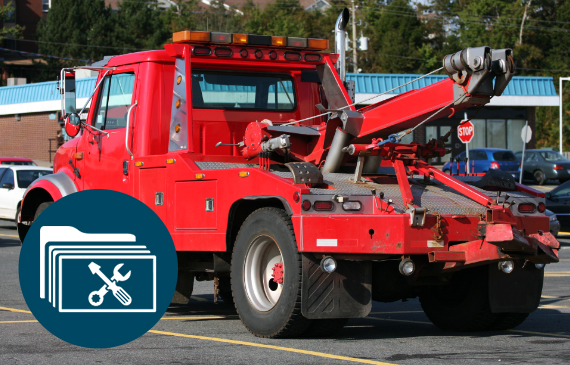When buying used tow trucks, the saying "One person's lemon is another person's lemonade" rings true. What may seem like a lemon—a vehicle fraught with issues—can be transformed into a lucrative opportunity with the proper perspective and approach. However, this transformation hinges on one crucial factor: awareness.
Understanding the issues and history of the tow truck you're considering isn't just about assessing initial costs; it's about foreseeing the short-term and long-term operational expenses. Armed with this knowledge, you can evaluate deficiencies not as obstacles but as potential avenues to secure a tow truck at an attractive price point.
In this article...
- What is a "Lemon" Used Tow Truck?
- How to Avoid Buying a "Lemon" Tow Truck
- The Bottom Line
In this guide, we begin on a journey to equip you with the knowledge and insights necessary to navigate the used tow truck market effectively. Let's explore the strategies that will empower you to make informed decisions and transform potential challenges into opportunities.
What is a “Lemon” Used Tow Truck?
A "lemon" used tow truck refers to a vehicle with significant defects or mechanical issues, often undisclosed by the seller, substantially impairing its safety, reliability, or value. It's a tow truck with inherent problems that make it unreliable or unsafe to purchase a used one despite its kempt and prim appearance.
The internal issues may take time to be apparent, leading to expensive repairs, frequent breakdowns, or even safety hazards. Lemon laws, which vary by jurisdiction, provide recourse for consumers who unknowingly purchase such vehicles, often offering legal remedies such as refunds or vehicle replacements.
Therefore, it's crucial for buyers to thoroughly inspect and research any used tow truck before purchasing to avoid ending up with a lemon.
How to Avoid Buying a “Lemon” Tow Truck
Buying a used tow truck is a substantial investment, and avoiding a subpar purchase is essential for your business's prosperity and peace of mind. To avoid buying a lemon tow truck, follow these essential steps:
1. Get a Vehicle History Report
When considering the purchase of a used tow truck, obtaining a comprehensive vehicle history report is essential. Services like CarFax provide detailed insights into the truck's past, offering valuable information that can influence your decision-making process.

Here's what you can expect to find in a typical vehicle history report:
Location History
The report reveals where the truck has been registered and operated throughout its lifetime. This information allows you to gauge the environment the truck has been exposed to, whether it's a dry region or one with harsh weather and road conditions.
Ownership History
Knowing the number of previous owners is crucial. Sometimes, lienholders may appear as separate owners, indicating the truck's financial history. Fewer owners generally suggest better maintenance and potentially smoother transactions.
Manufacturer Recalls or Campaigns
The report highlights any outstanding recalls or campaigns issued by the manufacturer. This information is vital as it can affect the safety and performance of the tow truck. Ensuring these recalls are addressed guarantees that the vehicle is current with any required repairs or modifications.
Mileage Progression
Comparing the reported mileage progression in comparison to odometer readings is also crucial. Inconsistencies could indicate odometer tampering or discrepancies, raising red flags about the truck's history and integrity.
Service History and Major Work Notations
The report may include details about past maintenance and repairs performed on the truck. This insight provides valuable context regarding the vehicle's condition and any potential issues that have been addressed.
Title Brands or Notations
Title brands like salvage or rebuilt titles are critical considerations when evaluating a used tow truck. While some may not immediately raise concerns, others could signal significant damage, affecting the truck's value and insurability. Similarly, odometer alerts may not always indicate tampering but could stem from legitimate reasons like "exempt" registration. Understanding these alerts is essential for an accurate assessment.
Ensuring Up-to-Date Vehicle History Reports
Ensuring the vehicle history report is recent and current is vital when considering a used tow truck purchase. A report covering the seller's possession period and the last 30 days provides up-to-date information on changes like ownership transitions and vehicle status alterations. Reviewing previous entries within the last two years offers a comprehensive view, as incidents like accidents or recalls may be added chronologically.
However, it's crucial to acknowledge the limitations of services like CarFax, as they may only capture some incidents due to voluntary reporting. Therefore, thorough scrutiny and asking pertinent questions are essential for comprehensively evaluating the tow truck's history and condition.
2. Thorough Test Drive and Detailed Examination
Before finalizing your decision on a used tow truck, it's essential to conduct a thorough test drive and delve deeper into its condition. Here's how:
Seek Expert Advice
If you need to become more familiar with the specific make or type of tow truck you're assessing, reach out to friends or associates who have operated similar equipment. Their experience can provide valuable insights into the nuances of the vehicle. Ask about their overall experience, including both positive and negative aspects, and the cost of operation.
Check Fluids
Before and after your test drive, inspect the fluids. Note any changes in appearance, color, smell, and levels. Be prepared to identify standard coolant colors for the make you're evaluating.
Drive on Varied Roads
Test the tow truck at varying speeds and on different types of roads. This lets you detect issues such as vibrations at highway speeds or pulling or drifting during braking. Pay attention to any abnormal sounds and ensure that cab functions work correctly.
Operate the Work Bed
If applicable, test all directions, controls, and accessories of the work bed, including winches, lighting, and remotes.
Inspect the Body and Interior
Thoroughly examine the body and interior of the truck for modifications or replacements.

Check if body parts match in color, both inside and outside. Address any areas noted in the vehicle history report or mentioned by the seller.
Certifications and Inspections
Determine if your vehicle requires a permit, licensing, or insurance certification. Check for recent inspections or certifications and know their validity period. If an upcoming inspection is due, estimate the cost and identify any necessary repairs.
By following these steps and conducting a comprehensive test drive, you can ensure that you're making an informed decision when purchasing a used tow truck.
3. Thorough Inspection and Verification
After thoroughly examining the tow truck and verifying its history, there are a few more steps to ensure you're making the right decision:
Mechanical Inspection
Consider investing in a multipoint mechanical inspection from a reputable shop once you decide to proceed with the purchase. This inspection can provide insights into the overall condition of the tow truck, including the life expectancy of maintenance items like tires, belts, hoses, and fluids.
Documentation of Maintenance History
Request documentation on the maintenance history and any significant component replacements.

If you're informed of an issue or notice something during the inspection, inquire about the cost to repair it and request a written quote if available. Similarly, if the seller claims a current valid certification, ask for supporting documentation.
Bed Functionality
If you need to familiarize yourself with the specific work bed on the truck, enlist someone you trust to operate all its functions. This includes engaging the power take-off (PTO) and testing bed movement, lights, remotes, and other specialized features.
Stress Assessment
Check for signs of over-stress on the truck, especially on the frame and work bed. Look for repaired cracks and ensure any repairs have been done correctly. Assess whether the components are straight, square, and aligned properly, as misalignment could indicate previous damage or overuse.
Emissions Compliance
Verify if the emissions system complies with all applicable laws or if any modifications have been made. This information is crucial for making an informed buying decision and avoiding legal issues.
Examine for Damage and Corrosion
If the vehicle history report indicates areas prone to use more complex or environmental factors, thoroughly inspect the truck for signs of damage or corrosion. Seek input from trusted individuals to determine if any observed issues are every day or cause for concern.
Web Search the VIN
A web search using the VIN can provide valuable insights into the truck's history beyond what's typically included in formal reports. Online forums, groups where people talk, and social media often have chats and posts about specific tow trucks. People who owned these trucks before may talk about their problems or worries.
Equipment Inclusion Clarity
A clear understanding of included equipment is crucial, influencing the tow truck's value, immediate expenses post-purchase, and future operating costs. By clarifying this aspect, you ensure alignment between your needs and what the truck offers. This transparency helps avoid unexpected costs and ensures you make a well-informed decision tailored to your business requirements.
Doing a thorough check and ensuring everything is fine is really important when buying a used tow truck. This thorough approach lets you identify any potential issues or concerns with the vehicle, ensuring you know its condition and history before finalizing the purchase.
By inspecting and verifying the tow truck thoroughly, you can minimize the risk of surprises and ensure that you are investing in a reliable and suitable vehicle for your needs.
The Bottom Line
Making an informed decision when purchasing a tow truck is crucial for success and financial stability. Thorough research, vehicle inspection, history verification, and equipment clarification are vital steps to avoid unpleasant surprises and ensure a reliable investment. By taking these measures, you set yourself on the right path to success.
Beacon Funding provides tailored financing options for tow truck purchases, offering flexible terms and competitive rates to meet your needs. With Beacon Funding's expertise and support, you can secure the financing you need to acquire the right tow truck for your business. Contact Beacon Funding today to explore your financing options and take the next step toward achieving your goals.
GET STARTED NOW